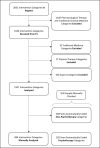Classification of psychotherapy interventions for people with schizophrenia: development of the Nottingham Classification of Psychotherapies
- PMID: 33355248
- PMCID: PMC10231480
- DOI: 10.1136/ebmental-2020-300151
Classification of psychotherapy interventions for people with schizophrenia: development of the Nottingham Classification of Psychotherapies
Abstract
Background: Currently, there is no accepted system for the classification of psychotherapies for application within systematic reviews. The creation of anuncomplicated, understandable and practical classification system is neccessary for conducting reliable systematic reviews.
Objective: To devise a system for classification of psychotherapy interventions-for use, initially, in systematic reviews.
Methods: Cochrane Schizophrenia's Register used as the source of randomised controlled trial. After being piloted and refined at least twice, finally we applied it to all relevant trials within the register. Basic statistical data already held within the register were extracted and used to calculate the distribution of schizophrenia research by form of psychotherapy.
Findings: The final classification system consisted of six definable broad 'boughs' two of which were further subdivided into 'branches'. The taxonomy accommodated all psychotherapy interventions described in the register. Of the initial 1645 intervention categories within the register, after careful recoding, 539 (33%) were psychotherapies (234 coded as 'Thought/Action' (cognitive & behavioural)-1495 studies; 135 'Cognitive Functioning'-652 studies; 113 'Social'-684 studies; 55 'Humanistic'-272 studies; 23 'Psychoanalytic/dynamic'-40 studies; and 63 'Other'-387 studies). For people with schizophrenia, across categories, the average size of psychotherapy trial is small (107) but there are notable and important exceptions.
Conclusion: We reported a practical method for categorising psychotherapy interventions in evaluative studies with applications beyond schizophrenia. A move towards consensus on the classification and reporting of psychotherapies is needed.
Clinical implications: This classification can aid clinicians, clinical practice guideline developers, and evidence synthesis experts to recognise and compare the interventions from same or different classes.
Keywords: adult psychiatry; child & adolescent psychiatry; delirium & cognitive disorders; forensic psychiatry; schizophrenia & psychotic disorders.
© Author(s) (or their employer(s)) 2021. No commercial re-use. See rights and permissions. Published by BMJ.
Conflict of interest statement
Competing interests: None declared.
Figures
References
-
- OCEBM Levels of Evidence Working Group . Oxford centre for evidence-based medicine, 2011. Available: https://www.cebm.net/index.aspx?o=5653" https://www.cebm.net/index.aspx?... [Accessed Oct 2019].
-
- Higgins J, Thomas J, Chandler J, et al. Cochrane Handbook for systematic reviews of interventions version 6: cochrane 2019.
-
- Shokraneh F, Adams CE. Classification of all pharmacological interventions tested in trials relevant to people with schizophrenia: a study-based analysis. Health Information and Libraries Journal 2020. - PubMed
MeSH terms
LinkOut - more resources
Full Text Sources
Medical



